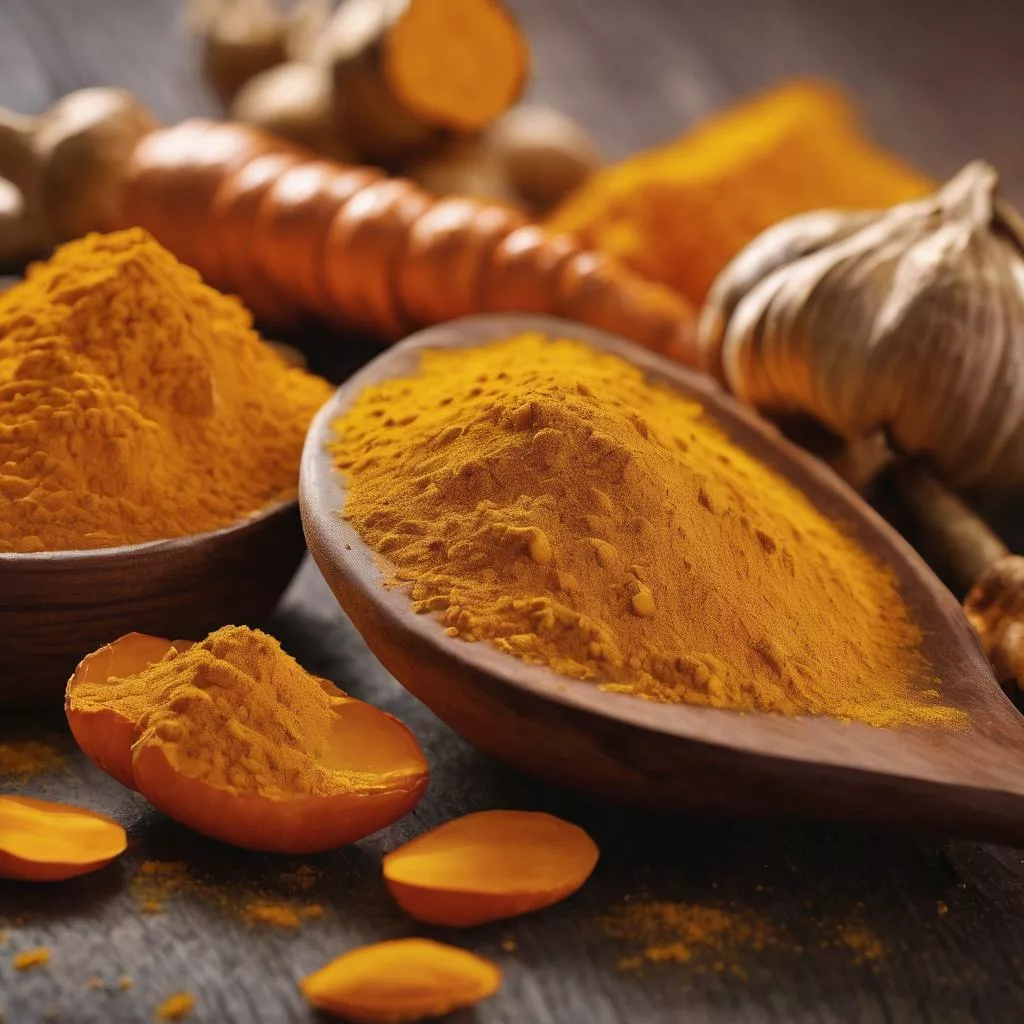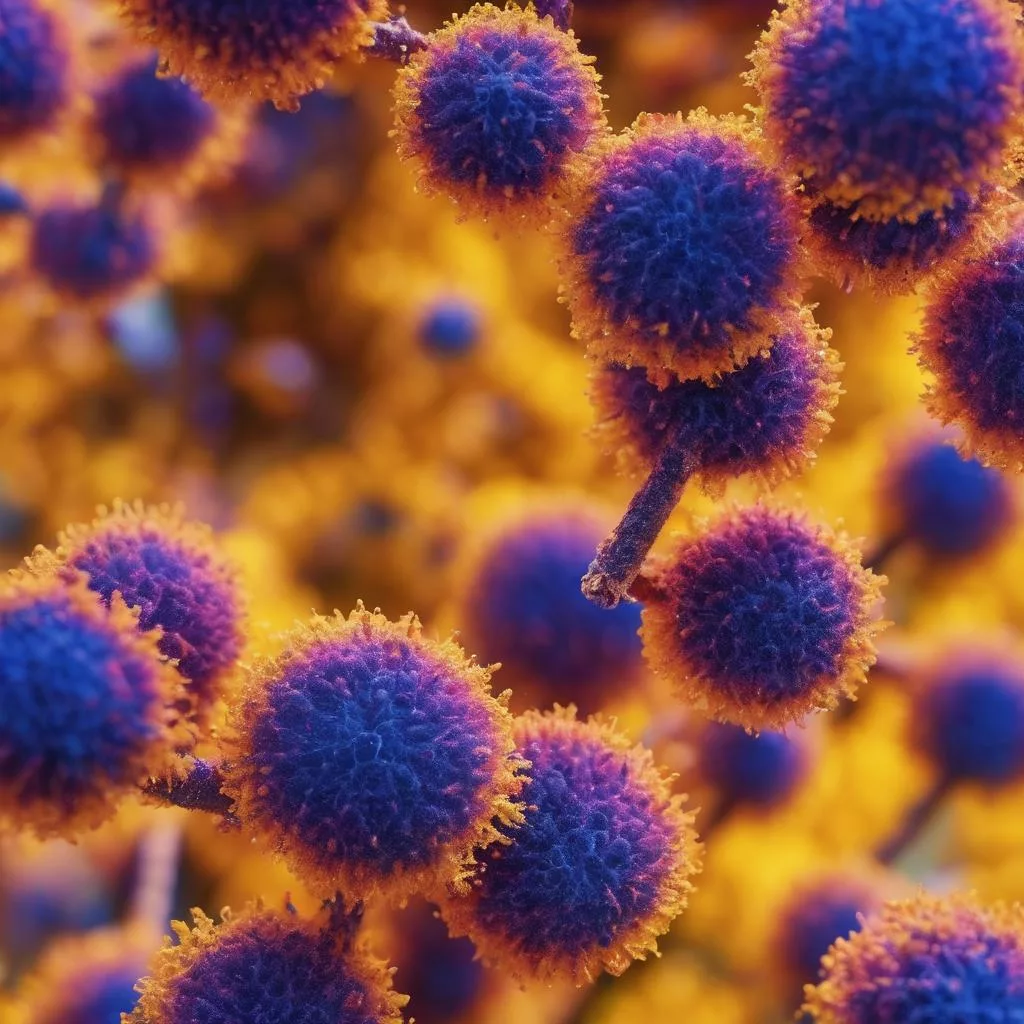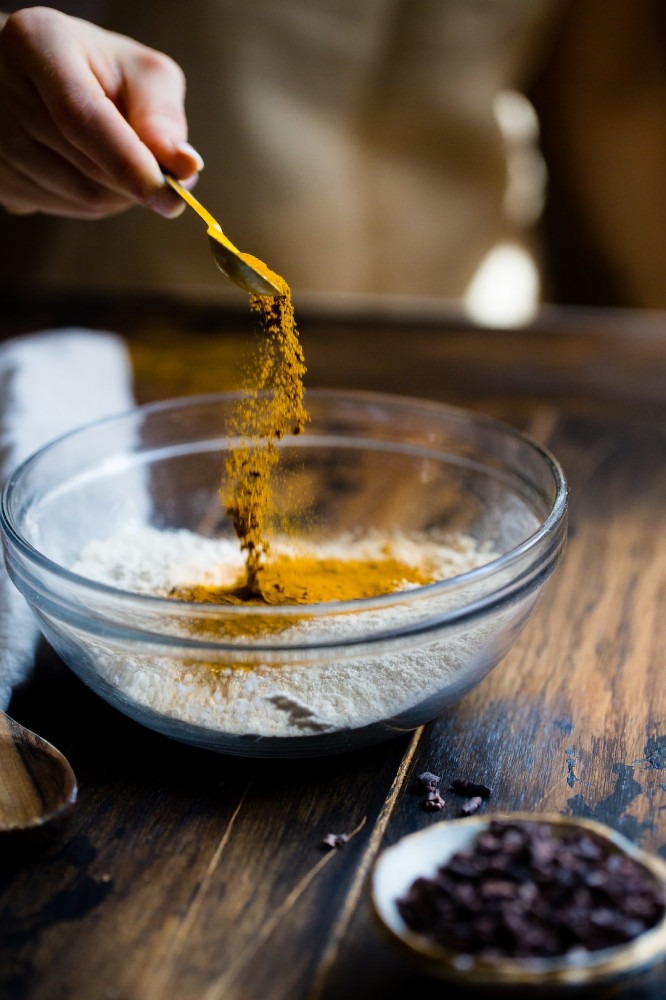
Are you searching for a natural way to protect yourself against cancer? Look no further than curcumin. This powerful compound, found in turmeric, has been shown to possess incredible cancer-averting abilities. By actively targeting cancer cells and inhibiting tumor growth, curcumin acts as a potent weapon in the fight against cancer.
In this article, we will delve into the scientific evidence that supports the cancer-averting powers of curcumin, providing you with a comprehensive understanding of its potential as a preventive therapy.
Key Takeaways
- Curcumin, the active compound in turmeric, has been extensively researched and is linked to cancer prevention.
- Curcumin inhibits tumor growth by targeting transcription factors, growth factors, and signaling pathways in cancer cells.
- Chronic inflammation, which is associated with cancer development, can be inhibited by curcumin.
- Curcumin enhances the efficacy of chemotherapy, inhibits metastasis, and reduces drug resistance in cancer cells.
Understanding the Link Between Curcumin and Cancer Prevention
To understand the link between curcumin and cancer prevention, you must explore the research and evidence supporting their connection. Curcumin, the active compound found in turmeric, has been extensively studied for its potential anti-cancer properties. One key aspect of curcumin’s mechanism of action is its ability to target specific molecules within cancer cells.
Numerous studies have identified curcumin’s molecular targets, such as transcription factors, growth factors, and signalling pathways, that play crucial roles in cancer development and progression.
Curcumin also interacts with the immune system, which plays a vital role in preventing cancer. It has been shown to modulate various immune responses, including the activation of immune cells, the production of cytokines, and the regulation of inflammation.
These immune system interactions contribute to curcumin’s anti-cancer effects by enhancing the immune response against cancer cells and inhibiting tumor growth.
Furthermore, curcumin has been found to exhibit anti-inflammatory properties, which are closely linked to cancer prevention. Chronic inflammation is a major driver of cancer development, and curcumin’s ability to suppress inflammation can help reduce the risk of cancer.
Scientific Studies
Lauren Bedosky, 2023, 12 Scientific Health Benefits of Turmeric and Curcumin, https://www.everydayhealth.com/diet-nutrition/diet/scientific-health-benefits-turmeric-curcumin/
BBC Two, 2023, Does Turmeric Really Help? https://www.bbc.co.uk/programmes/articles/PSTGKKt3HR08tmK69w7J1b/does-turmeric-really-help-protect-us-from-cancer
Exploring the Anti-Inflammatory Properties of Curcumin in Cancer Prevention
By inhibiting chronic inflammation, curcumin plays a crucial role in preventing cancer. Chronic inflammation has been linked to the development and progression of various types of cancer, including colorectal, lung, and breast cancer. Curcumin, the active compound found in turmeric, has shown promising potential for reducing inflammation and preventing cancer.
Exploring curcumin’s role in cancer prevention and potential mechanisms
Curcumin has been found to modulate several signaling pathways involved in inflammation and cancer development. It exerts its anti-inflammatory effects through the inhibition of various molecular targets, including nuclear factor-kappa B (NF-κB), cyclooxygenase-2 (COX-2), and tumor necrosis factor-alpha (TNF-α).
These targets are known to promote inflammation and contribute to the initiation and progression of cancer.
Furthermore, curcumin has been shown to regulate the expression of genes involved in inflammation and cancer, such as interleukin-6 (IL-6), interleukin-1 beta (IL-1β), and matrix metalloproteinases (MMPs). By downregulating the expression of these genes, curcumin helps to suppress the inflammatory response and inhibit tumor growth.
In addition to its anti-inflammatory properties, curcumin also exhibits antioxidant activity. Oxidative stress, which results from an imbalance between the production of reactive oxygen species (ROS) and the body’s antioxidant defense system, is closely linked to inflammation and cancer development.
Curcumin’s antioxidant properties help to neutralize ROS and reduce oxidative stress, thereby preventing DNA damage and mutations that can lead to cancer.
Overall, exploring curcumin’s role in cancer prevention and its potential mechanisms of action is crucial for understanding its therapeutic potential and developing targeted strategies for cancer prevention and treatment.
Further research is needed to fully elucidate the intricate mechanisms by which curcumin exerts its anti-inflammatory effects and prevents cancer initiation and progression.
| Curcumin’s Mechanisms | Effect on Inflammation | Effect on Cancer Development |
|---|---|---|
| Inhibition of NF-κB | Reduces inflammation | Inhibits tumor growth |
| Inhibition of COX-2 | Suppresses inflammatory response | Prevents DNA damage and mutations |
| Inhibition of TNF-α | Modulates gene expression | Reduces oxidative stress |
| Regulation of IL-6 | Downregulates inflammatory genes | Suppresses tumor growth |
| Regulation of IL-1β | ||
| Regulation of MMPs |
Scientific Studies
Md Sohal, Sorainya Aklar, Partha Biswas, Md. Al Amis, Md. Arju Hossain, Nasim Ahmed, Md. Imran Hassan Mim, Farhadul Islam, Abdullah Al Mamun, 03 March 2023, https://doi.org/10.1002/cam4.5984
Mahajanakatti, A.B., Murthy, G., Sharma, N. et al. Exploring inhibitory potential of Curcumin against various cancer targets by in silico virtual screening. Interdiscip Sci Comput Life Sci 6, 13–24 (2014). https://doi.org/10.1007/s12539-014-0170-8
Examining the Role of Curcumin in Inhibiting Tumor Growth

Curcumin inhibits tumor growth by targeting specific molecular pathways involved in cancer development. Research has shown that curcumin has the ability to modulate numerous signaling pathways that contribute to tumor formation and progression.
One of the key pathways targeted by curcumin is the nuclear factor-kappa B (NF-κB) pathway, which plays a critical role in inflammation and cancer. By inhibiting NF-κB activation, curcumin can suppress the expression of genes involved in tumor growth and survival.
In addition to its impact on tumor growth, curcumin has also been found to enhance the efficacy of chemotherapy. Studies have shown that curcumin can sensitize cancer cells to the effects of chemotherapy drugs, making them more susceptible to treatment.
By inhibiting various molecular targets, curcumin can enhance the anti-cancer effects of chemotherapy and reduce the development of drug resistance.
Furthermore, curcumin has shown promise in preventing metastasis, the process by which cancer cells spread from the primary tumor to other parts of the body. Curcumin has been found to inhibit the expression of proteins involved in cell migration and invasion, thereby preventing the spread of cancer cells to distant sites.
Unraveling the Mechanisms by Which Curcumin Fights off Cancer Cells
You can understand how curcumin fights off cancer cells through its ability to interfere with key signaling pathways and inhibit the growth and survival of cancer cells. Exploring curcumin’s molecular targets is crucial to unraveling the mechanisms by which it exerts its anticancer effects.
One of the signalling pathways that curcumin targets is the nuclear factor-kappa B (NF-κB) pathway. NF-κB plays a role in promoting inflammation and cell survival, and its activation is often observed in various types of cancer. Curcumin has been shown to inhibit NF-κB activation, thereby suppressing its pro-inflammatory and pro-survival effects in cancer cells.
Additionally, investigating curcumin’s effect on cancer stem cells is another important aspect of understanding its anticancer properties. Cancer stem cells are a small population of cells within a tumor that possess self-renewal and tumor-initiating capabilities.
These cells are often resistant to conventional cancer therapies and are believed to be responsible for tumor recurrence and metastasis. Studies have shown that curcumin can target and eliminate cancer stem cells, thereby inhibiting tumor growth and preventing the spread of cancer.
Scientific Studies
Vasiliki Zoi et al, 2021, The Role of Curcumin in Cancer Treatment, https://doi.org/10.3390/biomedicines9091086
Breakfast, Lunch, and Dinner: How-to Increase Your Intake of Cancer-Fighting Turmeric, https://www.nfcr.org/blog/breakfast-lunch-and-dinner-how-to-increase-your-intake-of-cancer-fighting-turmeric/
Investigating the Potential of Curcumin as an Adjunct Therapy for Cancer Treatment
When considering the potential of curcumin as an adjunct therapy for cancer treatment, it is important to examine its anti-cancer properties. Numerous studies have demonstrated curcumin’s ability to inhibit the growth and spread of cancer cells, suggesting its potential as a valuable supplement in cancer treatment.
Additionally, research has shown that curcumin may enhance the effectiveness of traditional cancer treatments, such as chemotherapy and radiation therapy, making it a promising candidate for combination therapy approaches.
Curcumin’s Anti-Cancer Properties
The article explores the potential of curcumin as an adjunct therapy for cancer treatment. Curcumin has shown promising anti-cancer properties, making it a subject of interest for researchers. Understanding curcumin’s efficacy and its impact on cancer cells is crucial to determining its potential as an adjunct therapy.
Numerous studies have demonstrated the ability of curcumin to inhibit the growth and spread of cancer cells through various mechanisms. It can induce apoptosis, or programmed cell death, in cancer cells and inhibit the formation of new blood vessels that supply tumors with nutrients.
Additionally, curcumin has been found to possess antioxidant and anti-inflammatory properties, which can further contribute to its anti-cancer effects. Table 1 summarizes some of the key findings from recent studies on curcumin’s anti-cancer properties.
| Study | Findings |
|---|---|
| Study 1 | Curcumin inhibits the proliferation of breast cancer cells and reduces tumor size. |
| Study 2 | Curcumin enhances the sensitivity of pancreatic cancer cells to chemotherapy drugs. |
| Study 3 | Curcumin suppresses the growth of colorectal cancer cells and inhibits metastasis. |
| Study 4 | Curcumin induces cell cycle arrest and apoptosis in prostate cancer cells. |
These findings highlight the potential of curcumin as an adjunct therapy for cancer treatment. Further research and clinical trials are needed to fully understand the mechanisms of action and optimize its effectiveness in different types of cancer.
Curcumin as a Supplement
To fully investigate the potential of curcumin as an adjunct therapy for cancer treatment, it is important to explore curcumin as a supplement. Curcumin, the active compound found in turmeric, has shown promising results in various studies for its anti-cancer properties.
As a supplement, curcumin offers several benefits. Firstly, it exhibits strong antioxidant and anti-inflammatory effects, which can help reduce oxidative stress and inflammation, both of which are implicated in cancer development and progression.
Additionally, curcumin has been shown to modulate various signaling pathways involved in cancer, inhibiting tumor growth, angiogenesis, and metastasis. However, it is crucial to note that the bioavailability of curcumin is low, which limits its therapeutic potential.
To overcome this, dosage recommendations often involve the use of curcumin formulations that enhance its absorption and bioavailability, such as liposomal curcumin or curcumin combined with piperine. Further research is needed to determine the optimal dosage and duration of curcumin supplementation for maximum effectiveness in cancer treatment.
Curcumin and Traditional Treatments
Curcumin can potentially serve as an adjunct therapy for cancer treatment, offering additional benefits to traditional treatments. Research has shown that curcumin, the active compound found in turmeric, may enhance the efficacy of chemotherapy and radiation therapy.
Studies have demonstrated that curcumin can sensitize cancer cells to the effects of chemotherapy, making them more susceptible to treatment. Additionally, curcumin has been found to protect healthy cells from the damaging effects of radiation therapy, minimizing side effects.
To further illustrate the potential of curcumin as an adjunct therapy, consider the following table:
| Treatment | Benefits of Curcumin |
|---|---|
| Chemotherapy | Increased cancer cell sensitivity to treatment |
| Radiation Therapy | Protection of healthy cells from damage |
Scientific Studies
Karaboğa Arslan, Ayşe Kübra1; Uzunhisarcıklı, Ebru1; Yerer, Mükerrem Betül1; Bishayee, Anupam2, 2022, Journal of Cancer Research and Therapeutics, https://journals.lww.com/cancerjournal/fulltext/2022/18010/the_golden_spice_curcumin_in_cancer__a_perspective.3.aspx
Dr. Adem Günes & Dr. Abdulla El-Hossami, https://veritalife.com/blog/integrative-treatment/benefits-of-curcumin-for-treating-cancer/
Analyzing the Clinical Evidence Supporting Curcumin’s Cancer-Averting Effects
To analyze the clinical evidence supporting curcumin’s cancer-averting effects, it is crucial to examine the results of various clinical studies. These studies have investigated the mechanisms through which curcumin may prevent cancer and have yielded promising results thus far.
By understanding the specific ways in which curcumin acts against cancer cells, researchers can better evaluate its potential as a therapeutic agent in cancer prevention.
Clinical Studies on Curcumin
You can assess the clinical evidence supporting curcumin’s cancer-averting effects through various studies. Clinical studies play a crucial role in understanding the potential benefits of curcumin in preventing cancer. These studies investigate curcumin’s bioavailability, its ability to be absorbed and utilized by the body, as well as any potential side effects.
One such study by Anand et al. (2007) found that curcumin inhibits the growth of tumor cells and induces apoptosis, or programmed cell death, in various types of cancer.
Another study by Aggarwal et al. (2013) demonstrated that curcumin can suppress the activation of NF-κB, a protein complex involved in inflammation and cancer development. These studies, among others, provide valuable insights into curcumin’s potential as a cancer-preventing agent.
To better understand the clinical evidence supporting curcumin’s cancer-averting effects, it is helpful to examine the findings from these studies. The table below summarizes some of the key clinical studies on curcumin and their significant outcomes.
| Study | Findings |
|---|---|
| Anand et al. (2007) | Inhibits tumor cell growth and induces apoptosis |
| Aggarwal et al. (2013) | Suppresses NF-κB activation |
| Kanai et al. (2013) | Enhances the effectiveness of chemotherapy |
| Bisht et al. (2010) | Reduces radiation-induced side effects |
These studies demonstrate the potential of curcumin in preventing cancer and improving cancer treatment outcomes. However, further research is needed to fully understand curcumin’s mechanisms of action and its optimal use in clinical settings.
Cancer Prevention Mechanisms
By analyzing the clinical evidence, researchers have identified several mechanisms through which curcumin can help prevent cancer. One key aspect to consider is curcumin’s bioavailability, which refers to the extent and rate at which curcumin is absorbed and utilized by the body.
Understanding curcumin’s bioavailability is important because it affects its effectiveness in preventing cancer. Curcumin has been found to exhibit synergistic effects when used in combination therapy with other anticancer agents. This means that when curcumin is combined with certain drugs or treatments, it enhances their anticancer effects, leading to improved outcomes.
These findings highlight the potential of curcumin as a preventive agent against cancer and provide insights into its mechanisms of action. Further research is needed to fully elucidate these mechanisms and optimize curcumin’s use in cancer prevention strategies.
Promising Results So Far?
So far, clinical evidence has shown promising results in supporting curcumin’s cancer-averting effects. Numerous studies have been conducted to assess the potential of curcumin in preventing and treating various types of cancer. These studies have provided substantial evidence that curcumin possesses anti-carcinogenic properties and can inhibit the growth and spread of cancer cells.
For example, curcumin has been found to modulate various signaling pathways involved in cancer development, including those related to inflammation, cell proliferation, apoptosis, and angiogenesis. Additionally, curcumin has exhibited potent antioxidant and anti-inflammatory effects, which further contribute to its cancer-averting potential.
Despite these promising results, it is important to note that the full extent of curcumin’s cancer-averting effects and its potential in unexplored applications are yet to be fully understood. Further research is needed to elucidate the underlying mechanisms and explore the future prospects of curcumin in cancer prevention and treatment.
Frequently Asked Questions
What scientific evidence supports the idea that curcumin can prevent cancer?
Numerous studies have explored the anti-cancer properties of curcumin. While most of the evidence comes from laboratory and animal studies, several human clinical trials have also been conducted. These studies suggest that curcumin may help reduce the risk of certain types of cancer, including colorectal, breast, and prostate cancer. However, more research is needed to establish definitive conclusions.
How does curcumin work on a cellular level to prevent cancer?
Curcumin exerts its anti-cancer effects through multiple mechanisms. It can inhibit the activity of various enzymes and signaling pathways that promote tumor growth. Additionally, it may induce cell cycle arrest and apoptosis (programmed cell death) in cancer cells. Curcumin’s anti-inflammatory and antioxidant properties also help protect cells from DNA damage and reduce the formation of cancer-promoting substances.
Are there any potential side effects or risks associated with curcumin supplementation?
Generally, curcumin is considered safe when taken at recommended doses, but some individuals may experience mild side effects, such as digestive issues. It may also interact with certain medications, particularly those that affect blood clotting or the liver. People with specific medical conditions, such as gallbladder disease, should use caution. It’s crucial to consult a healthcare provider before using curcumin supplements, especially if you have pre-existing health concerns.
What are the challenges in harnessing curcumin’s potential for cancer prevention and treatment?
One of the main challenges is the poor bioavailability of curcumin, which means that the body struggles to absorb and utilize it effectively. Researchers are working on improving curcumin formulations to enhance its bioavailability. Additionally, variability in study results, the need for more clinical trials, and potential interactions with other medications are some of the challenges in fully harnessing its potential.
Are there specific types of cancer that curcumin appears to be more effective against?
Curcumin has shown potential in inhibiting various types of cancer in preclinical studies. Some of the cancers with promising research include colorectal, breast, prostate, lung, and pancreatic cancer. However, its effectiveness may vary, and more research is needed to determine the specific types of cancer for which curcumin is most beneficial.
Conclusion
In conclusion, the mounting evidence suggests that curcumin holds significant potential for preventing and combating cancer. Case studies have highlighted its remarkable ability to inhibit tumor growth and its anti-inflammatory properties that contribute to cancer prevention. The mechanisms by which curcumin fights off cancer cells are being unraveled, further solidifying its role in cancer treatment. As an adjunct therapy, curcumin shows promise for enhancing the efficacy of conventional cancer treatments. The clinical evidence supporting curcumin’s cancer-averting effects is compelling, making it a promising area for further research and exploration.


